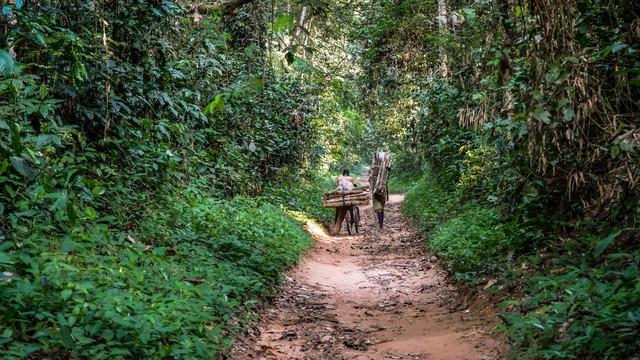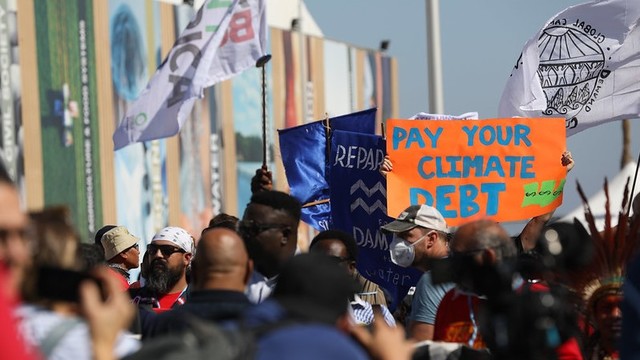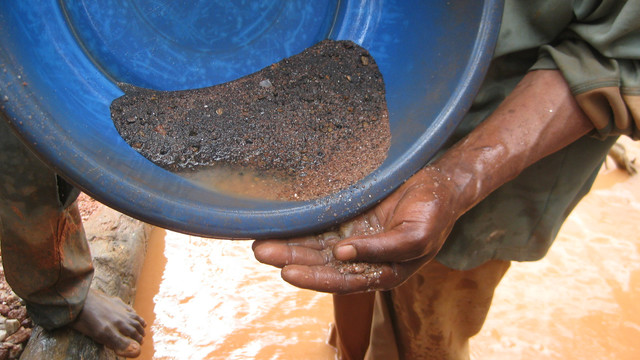
An increase in rent and a five-year maintenance programme on IIED's Gray’s Inn Road property has led to increased support costs in 2015/16 (Photo: Matt Wright/IIED)
IIED has grown in recent years. While income has remained relatively static over the past five years, the average number of employees has increased by some 28% during that period (from 93 employees in 2011/12 to 119 in 2015/16).
Measured through the average number of employees, growth steadied in 2015/16 (from 117 employees to 119 employees). This trend is reflected in the attributed income reducing slightly from £18 million in 2014/15 to £17.9 million in 2015/16.
Support costs increased year on year from £3 million in 2014/15 to £3.4 million in 2015/16. This increase has been attributed to the strengthening of the directorate to manage a growing organisation (£198,000), an increase in rent (£117,000) and a five-year maintenance programme on our Gray’s Inn Road property (£98,000).
Reserves policy
As set out in Note 8 of the accounts, our unrestricted reserves closed the year at £2.36 million, an increase of £108,000 over last year (£2.25 million).
This increase follows a £172,000 reduction in the building and capital fund designated reserve, which tracks the value of leasehold improvements over the remaining lease period on the Gray's Inn Road site.
After removing the impact of designated funds, free reserves increased by £280,000 (from £1.29 million to £1.57 million in the year) which is above the £250,000 target set for the year under our policy as detailed below.
The reserves policy requires an annual review to reassess the risks and any changes in llED's income, financial obligations and expenditure. We reviewed the policy during the year and our impact assessment of possible adverse financial events reaffirmed the agreed reserves policy established in 2012.
This concluded that, to protect the organisation and its charitable programme against the risks of funding loss through income shortfalls and other unexpected financial losses, the appropriate target for free reserves should represent approximately four months of operating costs and staff salaries less liabilities from employee benefits (around £2.2 million). We have therefore set the target range of free reserves at between £1.9 million and £2.5 million.
The current free reserves of £1 .57 million therefore falls beneath the lower end of this target range, and the board has endorsed the target growth of free reserves by £250,000 in both 2016/17 and 2017/18.
The latest trustees report contains detailed financial information, including a breakdown of all income received by IIED above £10,000.
In accordance with the requirements of FRS 102 – the financial reporting standard applicable in the UK and Republic of Ireland – we recognise liabilities resulting from employee benefits, which restated the opening unrestricted reserves by £0.31 million (from £2.56 million to £2.25 million).
Investment policy
We invested our reserves in a combination of high-interest cash deposits and fixed-term treasury deposits during 2015/16. This policy produces an acceptable rate of return while giving us flexibility to access funds.
Related parties
Some IIED trustees are also trustees of other charities, or directors or senior officers in other organisations IIED works with as a normal part of its research activities. Where such work involves payment, they enter into arm's length contracts and any payments related to these contracts are detailed in the notes to the accounts. The board operates a conflicts of interest policy.
Plans for future periods
llED's strategy for 2014-19, 'Engaging for change', is ambitious, anticipating continued growth in our four principal research groups and other areas. To support this, we have improved our business planning process, resulting in a comprehensive new business plan for the next financial year.
We continue to strengthen our operations by improving cost recovery, organisational development and fundraising with the 'How Programme' and better integrated cross-institutional systems with the Systems Integration Programme. Our cost recovery model requires IIED to continue its steady growth over the next few years by increasing the number of fee-earning staff while holding our core costs steady.
Previous reports
See the financial summaries from previous years: 2015; 2014; 2013
2015/16 financial summary
Donors
Department for Environment, Food and Rural Affairs (Defra)
Royal Danish Ministry of Foreign Affairs
Department for Environment, Food and Rural Affairs (Darwin)
Department for Foreign Affairs and Trade (Australia)
Department for International Development (DFID)
Department of Energy and Climate Change (DECC)
Federal Ministry for the Environment (Germany)
Irish Aid, Department of Foreign Affairs
Minister for Foreign Affairs and Trade for Ireland
National Renewable Energy Laboratory (NREL)
Norwegian Embassy Mozambique
Scottish Government
Swedish International Development Cooperation Agency (SIDA)
International and multilateral agencies
Asian Development Bank
Centre for International Forestry Research (CIFOR)
European Commission
International Fund for Agricultural Development (IFAD)
United Nations Office for Project Services (UNOPS)
United Nations Development Fund (South Africa)
United Nations Environment Programme (UNEP)
United Nations Economic Commission for Africa (UNECA)
United Nations Environment Programme (Kenya)
United Nations Food and Agriculture Organisation (FAO)
United Nations Population Fund (UNFPA)
World Bank
Foundations and NGOs
3IE International Initiative for Impact Evaluation
AECOM
Aidenvironment
Andes
Arcus Foundation
Arran Lule Sami Centre
Bernstein Family Foundation
Binks Trust
British Council
Care International
Climate Change Agriculture Food Security (CCAFS)
Ceso Ci Internacional
Climate and Development Knowledge Network (CDKN)
Climateworks Foundation
Comic Relief
Cordaid
Danish 92 Group
Ecologic Institute
Ecosystems Service for Poverty Alleviation (ESPA)
Economic and Social Research Council (ESRC)
Eventbrite
Ford Foundation
Global Green Growth Institute (GGGI)
GRET
GIZ
Hivos
Institute of Development Studies (IDS)
International Development Research Centre (IDRC)
International Livestock Research Institute
International Centre for Environment Management
International Union for Conservation of Nature (IUCN)
Kings College London
London School of Hygiene and Tropical Medicine
Mava Foundation
Mercy Corps
Met Office (UK)
Charles Stewart Mott Foundation
Near East Foundation (NEF)
Norwegian Institute of International Affairs (NUPI)
Overseas Development Institute (ODI)
Oxfam
Pyoe Pin
Red Cross Red Crescent Climate Centre
Resource Advocacy Programme
Rockefeller Foundation
SNV Netherlands Development Organisation
Tanzania Natural Resource Forum
The Christensen Fund
The Tiffany & Co Foundation
Tufts University
University College London (UCL)
University of Copenhagen
University of Edinburgh
University of York
Vanguard Charitable
Wageningen University
Worldaware
World Conservation Monitoring Centre (WCMC)
World Resources Institute (WRI)
Worldwide Fund for Nature (WWF)
Corporate
Landell Mills Ltd



